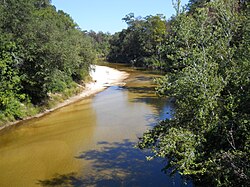브로메텐마디논 아세테이트
Bromethenmadinone acetate | |
| 임상자료 | |
|---|---|
| 기타 이름 | BMMA; 브롬슈퍼루틴; 6-브로모-16-메틸렌-17α-하이드록시-Δ-프로제스테론6 아세테이트; 6-브로모-16-메틸렌-17α-아세톡시프레냐-4,6-다이엔-3,20-디온 |
| 마약류 | 프로게스테겐; 프로게스틴; 프로게스테겐 에스테르 |
| 식별자 | |
| |
| CAS 번호 |
|
| 펍켐 CID | |
| 켐스파이더 | |
| 켐벨 | |
| 화학 및 물리적 데이터 | |
| 공식 | C24H29BRO4 |
| 어금질량 | 461.396 g·1996−1 |
| 3D 모델(JSmol) | |
| |
| |
브롬텐마디논 아세테이트(BMMA, 일명 브롬슈퍼루틴)는 체코슬로바키아에서 개발돼 1970년에 설명됐지만 시판된 적이 없는 프로게스틴 약품이다.[1][2][3][4][5][6][7][8][9] BMMA의 유사점으로는 클로르메텐마디논 아세테이트, 멜렌게스트롤 아세테이트, 메텐마디논 아세테이트 등이 있다.
참고 항목
참조
- ^ Stĕrba R (March 1970). "[Towards a more physiological hormonal contraception]". Zentralbl Gynakol (in German). 92 (10): 303–12. PMID 4096927. Archived from the original on 2018-09-16. Retrieved 2018-09-17.
- ^ Štěrba, R. (1971). "On the Way to a More Physiological Hormonal Contraception". Current Problems in Fertility. pp. 154–158. doi:10.1007/978-1-4615-8651-7_28. ISBN 978-1-4615-8653-1. Archived from the original on 2018-09-16. Retrieved 2018-09-17.
- ^ Cekan Z, Horesovský O (February 1971). "Elimination and metabolism of 6-chloro-17-alpha-hydroxy-16-methylene-4,6-pregnadiene-3,20-dione acetate and its analogues in rats". Acta Endocrinol. 66 (2): 303–16. doi:10.1530/acta.0.0660303. PMID 5107826.
- ^ Shapiro EL, Weber L, Harris H, Miskowicz C, Neri R, Herzog HL (July 1972). "Synthesis and biological activity of 17-esters of 6-dehydro-16-methylene-17 -hydroxyprogesterones". J. Med. Chem. 15 (7): 716–20. doi:10.1021/jm00277a006. PMID 5043870.
- ^ Míčková, R. (1973). "Steroid derivatives. LXXV. The preparation of polyhalogenated derivatives of progestational hormones and the determination of their conformation by circular dichroism spectra". Collection of Czechoslovak Chemical Communications. 38 (8): 2492–2503. doi:10.1135/cccc19732492. ISSN 0010-0765.
- ^ Wolff ME (August 1974). "A quantitative reexamination of structure-activity relationships in the delta6-6-substituted progesterone series". J. Med. Chem. 17 (8): 898–900. doi:10.1021/jm00254a025. PMID 4845383.
- ^ Topliss JG, Shapiro EL (June 1975). "Quantitative structure-activity relationships in the delta6-6-substituted progesterone series. A reappraisal". J. Med. Chem. 18 (6): 621–3. doi:10.1021/jm00240a020. PMID 1151979.
- ^ Wolff ME, Hansch C, Giannini DD, Kollman PA, Duax WL, Baxter J (1975). "Correlation of glucocorticoid and progestational activity with steric, electronic and hydrophobic parameters". J. Steroid Biochem. 6 (3–4): 211–4. doi:10.1016/0022-4731(75)90134-X. PMID 171485.
- ^ Coburn RA, Solo AJ (June 1976). "Quantitative structure-activity relationships among steroids. Investigations of the use of steric parameters". J. Med. Chem. 19 (6): 748–54. doi:10.1021/jm00228a002. PMID 950640.


